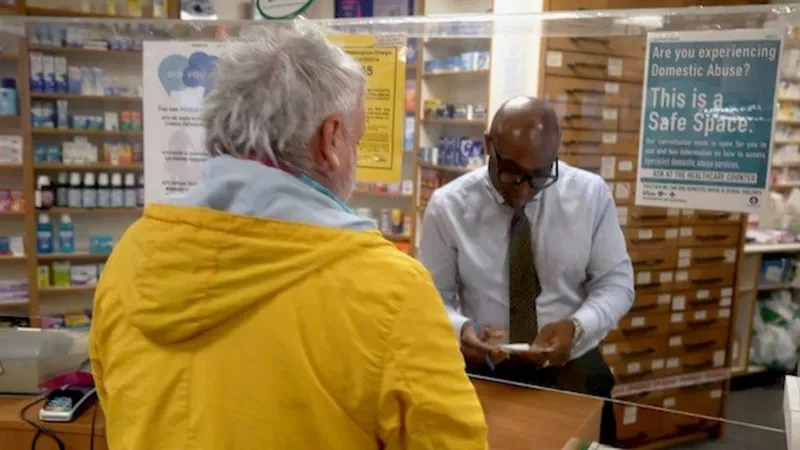
People with seven common ailments such as sore throat and earache can go into a chemist to be assessed, rather than making an appointment with their GP.
Under the Pharmacy First scheme, pharmacists in England can carry out consultations and issue antibiotics when appropriate.
The aim is to make it easier for people to get the help they need and free up millions of GP appointments.
Similar services already exist in Scotland, Wales and Northern Ireland.
Pharmacy groups have welcomed the move but there is concern over the number of chemists that have closed down, and funding for the scheme.
What can pharmacists supply medicines for now?
sore throat
earache
sinusitis
impetigo
shingles
infected insect bites
uncomplicated urinary tract infections in women
Patients can access the new service by walking straight into a chemist. They can also be referred by NHS 111, urgent treatment centres, emergency departments or their GP. Those who are not registered with a GP can still access the service.
If one of the seven conditions is diagnosed, pharmacists can give medicines to patients rather than sending them back to their GP. Patients who need more specialist or follow-up care will be referred onwards.
Pharmacies already offer advice on medicines – when to take them, information on side effects and how to dispose of them – and have always been somewhere patients can go for advice on symptoms.
You can also get emergency contraception and blood pressure checks at most pharmacies in England. Some offer advice on how to stop smoking, how to lose weight as well as screening and treatment for chlamydia, a common sexually-transmitted infection.
What happens at a consultation?
The pharmacist will ask about symptoms and possibly about any previous medical issues. They may ask for consent to check the patient’s health record if they can access it.
For some conditions, the pharmacist may perform an examination – for example of a patient’s ear.
This allows them to recommend the best course of action for each patient, which could include a treatment bought over the counter such as a cream or ointment, a restricted set of prescription-only medicines or advice that the issue will go away on its own.
The consultation will be noted and shared with GPs to add to the patient’s record.
Will more antibiotics be given out?
There is a strict protocol in place for providing medicines for each of the seven conditions, says Tase Oputu, who chairs the Royal Pharmaceutical Society (RPS) in England.
That includes giving information, advice and symptom relief before supplying antibiotics, if needed.
Antibiotics are used to treat or prevent bacterial infections, but do not work against viruses such as colds and flu.
Overuse of them in the past has meant they are becoming less effective against serious infections – known as antimicrobial resistance.
NHS England said the new service would be “continually” scrutinised in case there was any effect on that issue.
In Scotland, Wales and Northern Ireland, where the service is already running, the RPS said there was no evidence of an increase in levels of antibiotics supplied.
‘More choice’
More than 90% of community chemists had registered to deliver the new service, NHS England said.
They have been paid £2,000 each and will receive £15 per consultation plus £1,000 a month if they see a set minimum number of patients.
NHS England’s chief executive Amanda Pritchard called it “great news for patients”.
“GPs are already treating millions more people every month than before the pandemic – but with an ageing population and growing demand, we know the NHS needs to give people more choice and make accessing care as easy as possible,” she said.
The RPS called it a “leap forward” in patient care.
 Weekly Bangla Mirror | Bangla Mirror, Bangladeshi news in UK, bangla mirror news
Weekly Bangla Mirror | Bangla Mirror, Bangladeshi news in UK, bangla mirror news







